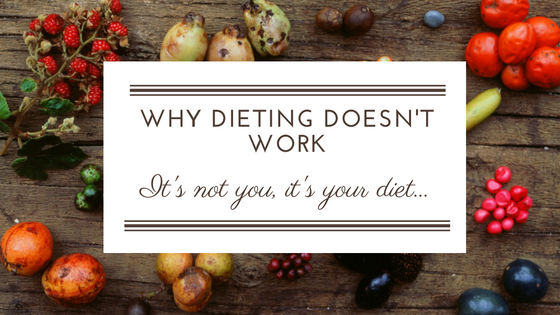Why Diets Fail Part 2 Introduction
With all of the current research into the biology of bodyweight regulation (and many other topics related to human genetics), a great many people have started to reach conclusions about bodyweight being completely biologically determined, how there’s nothing we can do about it, hence there’s no point in trying in the first place, etc. But, this is an incorrect interpretation of the data.
Now, I could go off on a multipage rant about this topic (genetics versus environment) here but I’ll spare you: the key fact to keep in mind is that our biology is never the only determinant of any factor of our biology or behavior. Ok, I take that back, our biology dictates that we will die, it’s about the only genetic certainty out there although some researchers think we can even fix that. At most, genetics contribute perhaps 50% (in that range) to any behavior or aspect of our biology. The other 50% (in that range) is environment. As any coach would tell you, the other 90% is mental (little joke there, folks).
Put differently, if you put someone with a high weight/fat ‘setpoint’ in a third world country where they have to perform daily hard labor and there is little food available, they would not get fat; the environment wouldn’t allow it because the food simply isn’t available. However, put them in the modern Western environment, with easy access to inexpensive, tasty, high calorie food and low daily activity requirements and they will get fat.
A good (and heavily researched) example of this is the Pima indians, a group that is divided into roughly two different environments but which share identical genetics. One group of Pima is living the standard Western lifestyle with rather minimal daily activity and easy access to tasty, high-calorie foods; the other is living a much more traditional lifestyle with high levels of daily activity and a more traditional diet. The first group shows a much more extreme prevalence of obesity and Type II diabetes than the second. Once again, it’s always genetics plus environment than determine the end result.
That is to say that the biological systems that are trying to pull bodyweight back to where it was (the ‘setpoint’) are not deterministic. Human biology works through tendencies and people seem to show varying abilities to resist or act against those tendencies. That is, people clearly do lose weight and successfully keep it off. Are they hungry? Probably. Are their bodies slowing metabolism? Sure. But they simply ignore those signals and control their food intake and increase activity to compensate.
Basically, they lose weight and keep it off regardless of the biology that is trying to pull them back to their previous weight. How do they do it? They do it by changing their behavior fairly permanently. Which is basically just a rather long winded way for me to introduce the next few chapters.
Do diets fail dieters or do dieters fail diets?
As I mentioned before, because of the generally dismal success rates when it comes to dieting, some have even concluded across the board that “Diets don’t work”. This is only true inasmuch as it ties into the other issues I want to discuss in the following chapters (as well as what I discussed last chapter). That is, realizing that diets fail quite often, we might ask what’s failing: the diet or the dieter. Who you ask determines the answer you get.
Generally speaking, the people who are designing and advocating certain diets tend to blame the failure on the dieter. They turn it into a discipline or a laziness issue. Registered dietitians are notorious for this: if their RDA approved diet fails, it’s obviously because you cheated. The idea that maybe the diet (or their overall dieting paradigm) is inherently flawed is not even considered.
On the other side, dieters tend to blame the failure on the diet, for a variety of different reasons. Of course, there is some truth to both of the positions and I want to look at both sides of the issue in the next two chapters. As I’ve mentioned, a diet will continue to work as long as the dieter sticks with it. The question then is why dieters have so much time sticking with diets in the long term, which is what I’m going to address next.
